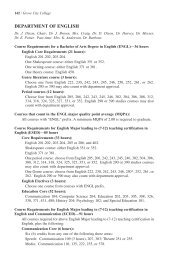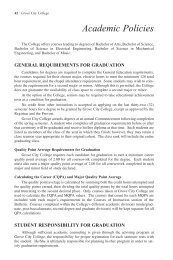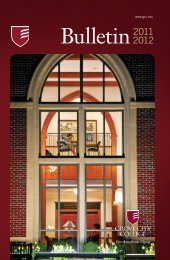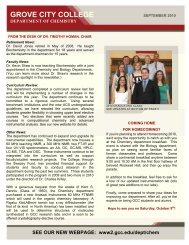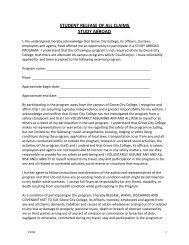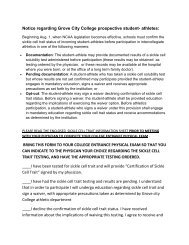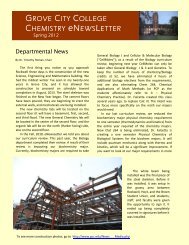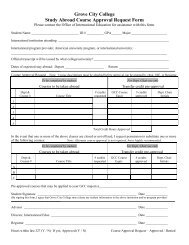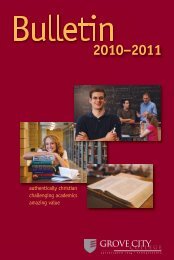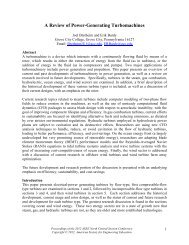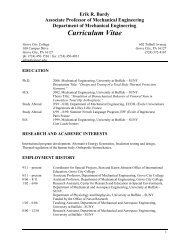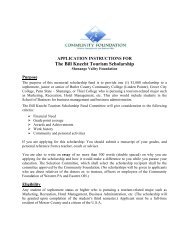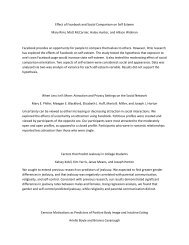2009–2010 - Grove City College
2009–2010 - Grove City College
2009–2010 - Grove City College
You also want an ePaper? Increase the reach of your titles
YUMPU automatically turns print PDFs into web optimized ePapers that Google loves.
Education / 117<br />
EDUC 325. TEACHING ELEMENTARY SCIENCE AND HEALTH. A course of instruction in<br />
methods of teaching elementary and preschool science, health, and physical education. Includes development<br />
of competencies in the planning and use of hands-on materials and application in classroom<br />
instruction. Directed field experience in the elementary schools is required. It is strongly recommended<br />
that this course be taken after completing Science 201, 202 or 203. Prerequisite: junior standing<br />
and completion of Education 327. Semester course, three hours.<br />
EDUC 326. TEACHING UPPER ELEMENTARY/MIDDLE LITERACY. A course designed to<br />
acquaint elementary, early childhood, and English education majors about methods to teach literacy<br />
(reading and the integrated language arts) to upper elementary and middle school level students.<br />
Topics include methods to develop vocabulary knowledge, comprehension, expressive writing, and<br />
content area reading. Direct field experience in elementary or middle schools is required.<br />
Prerequisites: junior or senior standing; elementary and early childhood majors must have completed<br />
Education 103, 201, 202, 323 and 327; English majors must have completed Education 103, 201 and<br />
202. Restricted to elementary education, early childhood, and English with English Education certification<br />
majors only. Spring semester only, three hours.<br />
EDUC 327. TEACHING ELEMENTARY MATHEMATICS. Elementary mathematics concepts<br />
and pedagogy will be introduced within the framework of the curriculum and evaluation standards recommended<br />
by the National Council of Teachers of Mathematics. Mathematical strands to be explored<br />
include: geometry; measurement; number sense; whole number operations; patterns and functions;<br />
fraction and decimal operations; graphing; statistics; and probability. A strong emphasis will be placed<br />
on problem solving as a skill needed to make informed decisions about life. All concepts will be taught<br />
with a dependence on manipulative activities. The scope of the course goes from early childhood to<br />
adolescence. A structured field experience is embedded within the course. It is strongly recommended<br />
that this course be completed before taking additional three-credit elementary methods courses.<br />
Prerequisite: sophomore standing. Semester course, three hours.<br />
EDUC 328. CHILDREN’S LITERATURE. A survey of children’s literature for early childhood,<br />
intermediate, and middle grades with an extensive representation of books from classic and contemporary<br />
authors and illustrators. Major literary genres are studied, story-telling techniques are discussed,<br />
and issues in literature for children are explored. A developmental perspective to selecting<br />
quality books is emphasized. Open to elementary and early childhood majors only. Junior or senior<br />
level course. Semester course, two hours.<br />
EDUC 330. LITERATURE AND WRITING FOR THE SECONDARY CLASSROOM. A course<br />
designed to familiarize the student with both theoretical and practical aspects of teaching literature and<br />
writing used at the secondary level. Included will be a discussion of literature selection, treatment of<br />
the material, and writing assessment procedures. Traditional works will be emphasized.<br />
Spring semester only, three hours.<br />
EDUC 340. EARLY CHILDHOOD FOUNDATIONS. This course provides an introduction to the<br />
history, philosophy, and goals essential to educating children from birth through age eight. Classical<br />
and contemporary early childhood program models are examined, a framework for a developmentally<br />
appropriate environment is established, and the role of the early childhood practitioner is emphasized.<br />
Observations of classrooms are integral to the course. It is recommended that this course be taken concurrently<br />
with Education 384. Sophomore or junior level course. Typically offered Fall semester.<br />
Semester course, three hours.<br />
EDUC 341. EARLY CHILDHOOD CURRICULUM AND INSTRUCTION. This course provides<br />
an overview of all curriculum components essential for operating an early childhood classroom with a<br />
focus on preschool and primary environments. Major curriculum approaches explored and implemented<br />
in early childhood settings include a traditional structured approach, a thematic approach, and<br />
the project approach. An awareness of learning styles, diversity, and special needs are integral to effective<br />
planning. The role of assessment in the curriculum sequence is included. Students are required to<br />
implement curriculum approaches in selected sites. Sophomore or junior level course. Prerequisites:<br />
Education 340 and 384. Typically offered Spring semester. Semester course, three hours.



